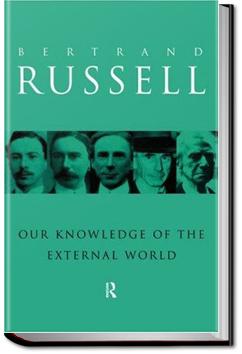UNLIMITED Audiobooks and eBooks
Over 40,000 books & works on all major devices
Get ALL YOU CAN for FREE for 30 days!
Our Knowledge of the External World as a Field for Scientific Method in Philosophy
Bertrand Russell
Book Overview:
Bertrand Russell gave the Lowell Lectures in March and April of 1914; these lectures produced 'Our Knowledge of the External World'. Russell attempts to analyze the relationship of the crude data of our senses to the notions of physics such as space, time, and matter. Russell takes his analysis to illustrate the method of logical analysis used to such wonderful effect by thinkers in the late nineteenth-century to the notions of continuity, infinity, and the infinitesimal. These analyses effected a new epoch of clarity in the philosophy of mathematics; Russell hopes that a similar new age of clarity can be effected in the rest of philosophy through logical analysis; here, he undertakes the first stages of this analysis in the philosophy of physics.
Bertrand Russell gave the Lowell Lectures in March and April of 1914; these lectures produced 'Our Knowledge of the External World'. Russell attempts to analyze the relationship of the crude data of our senses to the notions of physics such as space, time, and matter. Russell takes his analysis to illustrate the method of logical analysis used to such wonderful effect by thinkers in the late nineteenth-century to the notions of continuity, infinity, and the infinitesimal. These analyses effected a new epoch of clarity in the philosophy of mathematics; Russell hopes that a similar new age of clarity can be effected in the rest of philosophy through logical analysis; here, he undertakes the first stages of this analysis in the philosophy of physics.
How does All You Can Books work?
All You Can Books gives you UNLIMITED access to over 40,000 Audiobooks, eBooks, and Foreign Language courses. Download as many audiobooks, ebooks, language audio courses, and language e-workbooks as you want during the FREE trial and it's all yours to keep even if you cancel during the FREE trial. The service works on any major device including computers, smartphones, music players, e-readers, and tablets. You can try the service for FREE for 30 days then it's just $19.99 per month after that. So for the price everyone else charges for just 1 book, we offer you UNLIMITED audio books, e-books and language courses to download and enjoy as you please. No restrictions.
In the above statement, there are two obvious lacunæ: (1) How is the method of simple enumeration itself justified? (2) What logical principle, if any, covers the same ground as this metho. . . Read More
Try now for FREE!

"Love your service - thanks so much for what you do!"
- Customer Cathryn Mazer
"I did not realize that you would have so many audio books I would enjoy"
- Customer Sharon Morrison
"For all my fellow Audio Book & E-Book regulars:
This is about as close to nirvana as I have found!"
- Twitter post from @bobbyekat



Community Reviews
“Physicists, ignorant and contemptuous of philosophy, have been content to assume their particles, points, and instants in practice, while conceding, with ironical politeness, that their concepts laid no claim to metaphysical validity. Metaphysicians, obsessed by the idealistic opinion that only
Chapter 1 "Current Tendencies": Mr. Russell begins with the famous opening lines, "Philosophy, since the earliest times, has made greater claims, and achieved fewer results, than any other branch of learning. Ever since Thales said that all is water, philosophers have been ready with glib assertions
I liked most of it except its criticism of evolutionary epistemology, which makes sense because this book was published before many of the breakthroughs in evolutionary biology, like the discovery of the structure of DNA.
Students of philosophy will find this book intriguing as well as a dry read. The ideas portrayed by Russell and thought provoking although his writing isn't as lucid and comprehendible as his other books. Albeit, it's a decent read for whoever is interested in philosophy and with epistemology.
Ce livre La méthode scientifique en philosophie (édition Payot) est une série de conférences du célèbre mathématicien et philosophe états-unien athée du XXème siècle Bertrand Russell un des grands pionniers de la théorie des ensemble avec son collègue Alfred North Whitehead. Il traite de divers suje
When I was reading of the very last part of this book, I had tried so hard not to watch the football match of Man United. I didn't go to watch that although Man Utd is my favourite team among others because this book took all of my attractiveness :3
Bertrand Russell had one of the clearest, as well as the most brilliant minds of the 20th century. The clarity certainly shows here, because I was reading a wretchedly OCRd version on my Kindle, and though every eighth word was mangled I was still able to follow and make sense of what's really a pre
Highly recommended.